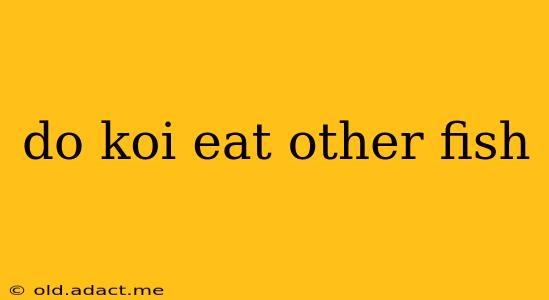Do Koi Eat Other Fish? A Comprehensive Look at Koi Diet and Behavior
Koi, those elegant and colorful carp, are a popular addition to ponds and water gardens worldwide. But a common question among koi keepers is: do koi eat other fish? The answer isn't a simple yes or no, and understanding their dietary habits is crucial for maintaining a healthy and balanced aquatic ecosystem.
What is a Koi's Natural Diet?
In the wild, koi are omnivores with a varied diet. Their primary food source consists of:
- Algae: They readily consume various types of algae, helping keep ponds clean.
- Insects: Aquatic insects, larvae, and even terrestrial insects that fall into the water are part of their natural diet.
- Plants: Koi will graze on aquatic plants, though this is less significant than their consumption of algae and insects.
- Small crustaceans: They'll also feed on small crustaceans like daphnia and water fleas.
This naturally diverse diet showcases their opportunistic feeding habits.
Will Koi Eat Other Fish? The Truth Behind the Myth
While koi are not typically aggressive predators hunting down and consuming other fish, the possibility exists under certain circumstances. Several factors influence whether koi might prey on other pond inhabitants:
-
Size and Age: Young, smaller koi may be more inclined to nibble on smaller fish eggs or fry (baby fish) due to their limited size and dietary needs. Larger, mature koi are less likely to actively hunt other fish, as their diets consist mostly of plant matter and commercially available koi food.
-
Food Availability: If koi are underfed or their primary food sources are scarce, they might resort to eating other fish as a supplementary food source. This is less about predatory behavior and more about survival.
-
Stress and Aggression: In overcrowded ponds or those lacking sufficient hiding places, koi may become stressed and aggressive, potentially leading to attacks on smaller fish or even fish of similar size.
-
Species of Fish: Koi may target fish species known to be slower or less adept at escaping. Fast, agile fish are less likely to be preyed upon.
What Fish Are Safe to Keep with Koi?
To minimize the risk of koi eating other fish, choosing compatible tank mates is vital. Generally, larger, more robust fish are less susceptible to predation. Some examples include:
- Larger goldfish: While smaller goldfish might be vulnerable, larger specimens are generally safe.
- Other types of carp: These often coexist peacefully with koi.
- Catfish (certain species): Some bottom-feeding catfish species are less likely to be targeted.
However, it's always best to monitor the interactions between koi and other fish, especially during the koi's younger stages.
How to Prevent Koi from Eating Other Fish
Here are some preventative measures to ensure the safety of your pond inhabitants:
- Provide ample food: Ensure that koi receive a sufficient amount of high-quality koi food to satisfy their dietary needs.
- Create plenty of hiding places: Rocks, plants, and submerged structures offer refuge for smaller fish.
- Monitor your pond regularly: Observe the interactions between your koi and other fish to identify any potential issues early.
- Choose compatible tank mates: Select fish species that are unlikely to be preyed upon by your koi.
- Consider pond size: A larger pond provides more space and reduces the chances of aggression.
Do Koi Eat Tadpoles?
Yes, koi may consume tadpoles, especially younger tadpoles, but as mentioned earlier, it's mostly an opportunistic feeding behavior rather than intentional hunting.
Do Koi Eat Snails?
Koi are known to eat snails, particularly those that move slowly or are already deceased.
Do Koi Eat Mosquito Larvae?
Yes, koi will consume mosquito larvae and other aquatic insects, acting as a natural form of mosquito control in your pond.
In conclusion, while koi are not naturally aggressive fish hunters, they might consume other fish under specific conditions. By understanding their dietary needs, creating a balanced environment, and selecting appropriate tank mates, you can minimize the risk of predation and ensure a harmonious coexistence of all the inhabitants in your pond.
